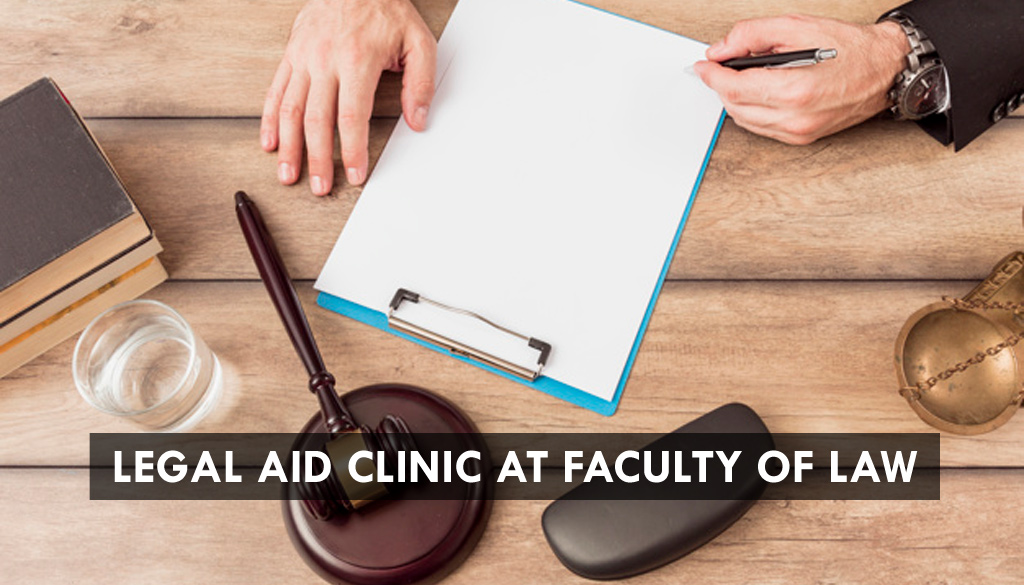
LEGAL AID CLINIC AT FACULTY OF LAW
“The concept of seeking justice cannot be equated with the value of dollars, Money plays no role in seeking justice.”
-Justice Blackmun
Legal Aid is a torchbearer for poor people who cannot afford the court proceedings. The road to seeking justice has never been a cheap one in India and everyone has to pay a huge monetary value at every stage of the trial. It is free legal assistance given to poor people in administrative proceedings, quasi-judicial proceedings, judicial proceedings, or any consultation regarding all legal problems. Legal Aid as explained by Justice P.N. Bhagwati was a nexus between legal aid and poor, downtrodden, illiterate people and made every possible effort to ensure easy access to the justice delivery system for them. One of the many objectives of this service is to provide equal justice to the downtrodden and poor people. This is not limited to free representation by an advocate in court proceedings but also extends to Legal Advice, Legal Awareness, Legal Mobilizations, Public Interest Litigation, Law reforms, Lok Adalats, and many such services that could prevent the injustice.
History of Legal Aid in India
A statutory right to provide free legal aid was added by the 42nd Constitutional Amendment in the year 1976, by inserting Article 39A under Chapter IV of the Constitution of India dealing with “Equal Justice and Free Legal Aid”. Major support has always been provided by the Union and State Judiciary for promoting free legal aid in India. It is a historical fact that Hon’ble Justice Krishna Iyer and Hon’ble Justice P.N. Bhagwati had played an efficient role in the legal aid movement, and had synthesized citizens of the nation regarding the importance of free legal aid in India. Various judgments by the judiciary like Hussainara Khatoon v. the State of Bihar, State of Haryana v. Darshana Devi, and Khatri v. the State of Bihar have proven effective in promoting the legal aid program. Act of 1987, titled as Legal Service Authority Act was drafted by the Union legislature to provide legislative backing to the legal aid movement in India. The Act was enforced and enacted by the efforts of Justice R.N. Mishra in the year 1995 after the final amendments were inserted in the Act.
Objectives of Legal Aid
This Act had 2 main objectives, first, to ensure that free legal services are being provided to the poor and weaker sections of the society and that no citizen of the nation is debarred from seeking justice due to any economic or other disability reason. Second, to ensure that there is no inequality within the justice delivery system. Category of the people who are entitled to this service of free legal aid is provided under Section 12 of this act. This Act incorporates institutional framework qua Legal Services at national, state, district, and taluka level, that is National Legal Services Authority, State Legal Services Authority, District Legal Services Authority, and Taluka Legal Services Authority respectively.
Challenges of Legal Aid in India
After so many initiatives by the Government of India, there remains a problem that needs to be resolved. Even today, affording a good advocate to represent oneself before the court is not possible for many people. Courtrooms are still loaded with a voluminous backlog of cases, and to reduce this burden, sometimes, Judges breach the principle of Natural Justice and do not provide the parties adequate time to present themselves before the court. There are some barriers in the way of the proper implementation of legal aid services in India as depressed classes in the society are still not having the awareness about the Fundamental Rights and Duties. To have a swift improvement in spreading legal awareness it is recommended that there must be Legal aid camps and Lok Adalats organized at every level and the aim must be to reach out to every possible individual who requires assistance and help the diversified society. Such camps must be organized in consonance with any Legal Service Authority to achieve maximum benefits from such camps.
Legal Aid at Manav Rachna
Faculty of Law, Manav Rachna University has a Legal Aid Cell operating since 2017. Many Legal Aid and Awareness Camps in association with DLSA have been organized by Legal Aid Cell since its inception. Legal Aid Cell comprises Faculty-in charge, President, Vice-President, Core Committee and other law student volunteers from all 5 years. While organizing a camp, the main objective of the committee is to spread legal awareness amongst depressed classes, spread knowledge about the Fundamental Rights and Duties being the citizens of this nation, Provide solutions for the specific problems in different matters, and attract as many audiences as possible for seeking legal assistance. In these hard times of COVID, the Faculty of Law is helping the society by organizing Legal Aid Camps in virtual mode and is gaining popularity by providing legal awareness online to the needy and indigent people and has been successful in achieving the goal of making legal advice and guidance handy to the people.
Written By:- Prof. Shivam Gaur, Assistant Professor, faculty of Law, MRU



